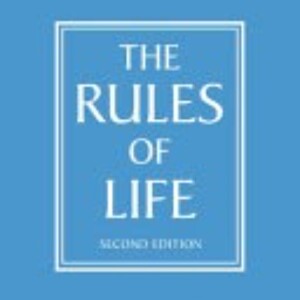

"Rules of Life" is not a single book but often refers to a variety of self-help and personal development guides that share common themes related to living a fulfilling and meaningful life. However, one well-known title is "The 10 Rules of Life" by author and speaker, Richard Templar.
Author's Background:
Richard Templar is a British author and business consultant known for his practical and straightforward approach to personal development and self-improvement. He has written several popular books on the subject, including "The Rules of Work" and "The Rules of Life," which draw upon his experiences in the business world and his observations of effective practices in personal and professional settings. Templar's writing often emphasizes simplicity, clarity, and actionable advice, making his work accessible to a broad audience.
Context of the Book:
"Rules of Life" (or "The Rules of Life") typically aims to offer guidelines for personal growth, decision-making, and overall happiness. The book distills life lessons into a series of rules or principles that readers can easily understand and apply to their own lives.
- Philosophical Underpinnings: The book often takes inspiration from various philosophical traditions, including Stoicism and positive psychology, advocating for a balanced approach to life's challenges.
- Self-Improvement Genre: The context of the book fits squarely within the self-help genre, a genre that has gained significant popularity in recent decades. Readers seek practical advice to navigate complex personal and professional landscapes.
- Current Relevance: In today's fast-paced and often stressful world, many readers search for simple yet effective guidelines to find balance and fulfillment. Templar's work resonates with those looking for clear, actionable steps to improve their lives.
- Audience Appeal: The target audience for books like "Rules of Life" typically includes individuals in various stages of life, from young adults to established professionals, who are seeking guidance and motivation to achieve their personal and career goals.
Conclusion:
Overall, Richard Templar's "Rules of Life" serves as a practical guide aimed at helping readers navigate everyday challenges by adhering to certain principles and values. Its appeal lies in its accessible writing style and the relatability of its content, making it a valuable resource for those interested in personal development.
Chapter 2 Analysis of main characters and plot"Rules of Life" by Richard Templar is more of a self-help book than a traditional narrative with characters and plot. Instead of developing characters or a story, Templar provides practical guidelines—"rules"—to help readers lead a more fulfilling life. Here are some key concepts that encompass the core content of the book:
- The Rules: The book outlines various principles that cover different aspects of life, such as relationships, personal growth, and happiness. Each rule serves as a piece of advice aimed at improving one’s outlook and interactions.
- Personal Responsibility: A recurring theme is the importance of taking responsibility for one's choices and actions. Templar encourages readers to own their decisions and learn from experiences.
- Positive Mindset: Templar emphasizes the power of a positive attitude. He suggests that optimism can significantly influence the quality of life, urging readers to cultivate a hopeful perspective.
- Relationships: Many rules address how to build and maintain healthy relationships, highlighting the importance of communication, empathy, and respect for others.
- Self-Reflection: Templar advocates for regular self-reflection and introspection. This process allows individuals to understand their values, goals, and areas for personal growth.
- Adaptability: The ability to adapt to change is another key concept. Templar discusses resilience and how being flexible can lead to better outcomes in various situations.
Overall, "Rules of Life" serves as a guide for readers to navigate life's challenges and improve their well-being through actionable advice and practical wisdom. By implementing these rules, individuals can foster a positive and fulfilling existence.
Chapter 3 Theme Exploration and Analysis"Rules of Life" by Richard Templar offers practical advice and insights for navigating the complexities of modern life. The book outlines various themes and principles that can serve as guidelines for personal growth and improved well-being. Here are some key themes explored in the book:
- Personal Responsibility
Templar emphasizes the importance of taking responsibility for one's own life. He suggests that individuals have the power to shape their destinies, and that acknowledging this power leads to empowerment and improved decision-making.
- Attitude Towards Life
A positive attitude is a recurring theme. Templar encourages readers to cultivate a mindset that focuses on possibilities rather than limitations. He discusses the significance of optimism and the impact of one’s attitude on overall life satisfaction.
- Relationships and Social Skills
The book explores the role of relationships in achieving a fulfilling life. Templar provides insights into effective communication, empathy, and how to build and maintain healthy relationships both personally and professionally.
- Success and Goals
Templar discusses the concept of success and the importance of setting and pursuing goals. He advocates for the idea that success is subjective and encourages readers to define their own measures of success rather than conforming to societal standards.
- Mindfulness and Presence
The idea of being present in the moment is emphasized throughout the book. Templar encourages readers to practice mindfulness and to appreciate the now, which can lead to greater satisfaction and reduced stress.
- Balance
Templar addresses the importance of balance in various aspects of life, including work and personal time, social life and solitude, and ambition and contentment. Finding equilibrium is portrayed as essential for long-term happiness.
- Dealing with Challenges
Coping with life's challenges is a significant theme. Templar provides strategies for resilience, stressing that setbacks are a natural part of life and can serve as opportunities for growth.
- Integrity and Honesty
The necessity of living with integrity and honesty is another important theme. Templar discusses how these qualities build trust and credibility, both with oneself and with others.
- Continuous Improvement
Lifelong learning and self-improvement are emphasized. Templar encourages readers to seek knowledge, embrace change, and adapt throughout their lives as a means of personal and professional development.
- Self-Acceptance
Accepting oneself as a unique individual is a vital part of Templar's philosophy. He promotes the idea that self-acceptance leads to authentic living and fosters genuine connections with others.
Conclusion
"Rules of Life" serves as a practical guide to navigating personal and professional challenges with a focus on creating a fulfilling and balanced life. Templar's rules and principles are designed to inspire readers to reflect on their lives, make informed choices, and embrace a proactive approach to living. Through these themes, the book encourages individuals to craft their own sets of rules that resonate with their values and goals, thus promoting a tailored approach to life.
Book https://www.bookey.app/book/rules-of-life
Author https://www.bookey.app/book/rules-of-life#Author
Quotes https://www.bookey.app/book/rules-of-life/quote
The Power of Now https://www.bookey.app/book/the-power-of-now
Youtube https://www.youtube.com/watch?v=WhXucYVJf7k
Amazon https://www.amazon.com/Rules-Life-personal-happier-successful/dp/1292085606
Goodreads https://www.goodreads.com/book/show/232088.The_Rules_of_Life
More Episodes
All Episodes>>Creat Yourt Podcast In Minutes
- Full-featured podcast site
- Unlimited storage and bandwidth
- Comprehensive podcast stats
- Distribute to Apple Podcasts, Spotify, and more
- Make money with your podcast














